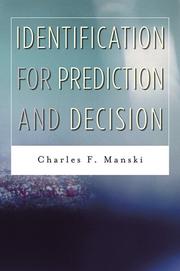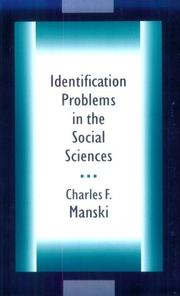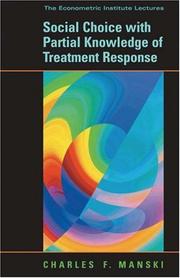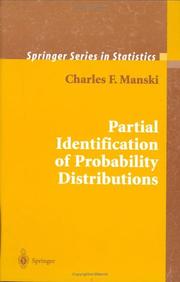| Listing 1 - 10 of 151 | << page >> |
Sort by
|

ISBN: 9780674026537 0674026535 0674033663 Year: 2007 Publisher: Cambridge: Harvard university press,
Abstract | Keywords | Export | Availability | Bookmark
 Loading...
Loading...Choose an application
- Reference Manager
- EndNote
- RefWorks (Direct export to RefWorks)
This book is a full-scale exposition of Charles Manski's new methodology for analyzing empirical questions in the social sciences. He recommends that researchers first ask what can be learned from data alone, and then ask what can be learned when data are combined with credible weak assumptions. Inferences predicated on weak assumptions, he argues, can achieve wide consensus, while ones that require strong assumptions almost inevitably are subject to sharp disagreements.Building on the foundation laid in the author's "Identification Problems in the Social Sciences" (Harvard, 1995), the book's fifteen chapters are organized in three parts. Part I studies prediction with missing or otherwise incomplete data. Part II concerns the analysis of treatment response, which aims to predict outcomes when alternative treatment rules are applied to a population. Part III studies prediction of choice behaviour.Each chapter juxtaposes developments of methodology with empirical or numerical illustrations. The book employs a simple notation and mathematical apparatus, using only basic elements of probability theory.
Quantitative methods in social research --- Quantitative methods (economics) --- Forecasting --- Social prediction --- Decision Making --- Methodology --- Decision making --- Forecasting - Methodology
Book
ISBN: 0412011417 9780412011412 Year: 1988 Publisher: New York: Chapman and Hall,
Abstract | Keywords | Export | Availability | Bookmark
 Loading...
Loading...Choose an application
- Reference Manager
- EndNote
- RefWorks (Direct export to RefWorks)
Quantitative methods (economics) --- Econometrics --- Estimation theory

ISBN: 0674442830 0674442849 9780674442832 Year: 1995 Publisher: Cambridge (Mass.): Harvard university press,
Abstract | Keywords | Export | Availability | Bookmark
 Loading...
Loading...Choose an application
- Reference Manager
- EndNote
- RefWorks (Direct export to RefWorks)
Quantitative methods in social research --- Estimation [Theorie de l' ] --- Estimation theory --- Schattingstheorie --- Social sciences --- Sciences sociales --- Statistical methods --- Research --- Méthodes statistiques --- Recherche --- 3.001.5 --- -#SBIB:014.IO --- #SBIB:303H510 --- #SBIB:303H12 --- maatschappijwetenschappen, methoden --- -Estimation theory --- 300 --- Behavioral sciences --- Human sciences --- Sciences, Social --- Social science --- Social studies --- Civilization --- Estimating techniques --- Least squares --- Mathematical statistics --- Stochastic processes --- Sociaalwetenschappelijk onderzoek. Research sociale wetenschappen --- Methoden sociale wetenschappen: statistische technieken, algemeen --- Methoden en technieken: sociale wetenschappen --- Estimation theory. --- Statistical methods. --- 3.001.5 Sociaalwetenschappelijk onderzoek. Research sociale wetenschappen --- Méthodes statistiques --- #SBIB:014.IO --- Social sciences - Statistical methods --- Social sciences-statistical methods

ISBN: 0691121532 9780691121536 0691217734 Year: 2005 Publisher: Princeton: Princeton university press,
Abstract | Keywords | Export | Availability | Bookmark
 Loading...
Loading...Choose an application
- Reference Manager
- EndNote
- RefWorks (Direct export to RefWorks)
Social sciences --- Social choice --- Estimation theory --- Statistical methods --- 304 --- 330.115 --- Sociale politiek. Maatschappelijke opbouw. Sociale problemen, vraagstukken --- Econometrie --- 330.115 Econometrie --- 304 Sociale politiek. Maatschappelijke opbouw. Sociale problemen, vraagstukken --- Choice, Social --- Collective choice --- Public choice --- Choice (Psychology) --- Social psychology --- Welfare economics --- Estimating techniques --- Least squares --- Mathematical statistics --- Stochastic processes --- Social sciences - Statistical methods
Book
ISBN: 0674067541 0674066898 9780674067547 0674071301 9780674066892 9780674071308 Year: 2013 Publisher: Cambridge, Mass. Harvard University Press
Abstract | Keywords | Export | Availability | Bookmark
 Loading...
Loading...Choose an application
- Reference Manager
- EndNote
- RefWorks (Direct export to RefWorks)
Public policy advocates routinely assert that "research has shown" a particular policy to be desirable. But how reliable is the analysis in the research they invoke? And how does that analysis affect the way policy is made, on issues ranging from vaccination to minimum wage to FDA drug approval? Charles Manski argues here that current policy is based on untrustworthy analysis. By failing to account for uncertainty in an unpredictable world, policy analysis misleads policy makers with expressions of certitude. Public Policy in an Uncertain World critiques the status quo and offers an innovation to improve how policy research is conducted and how policy makers use research. Consumers of policy analysis, whether civil servants, journalists, or concerned citizens, need to understand research methodology well enough to properly assess reported findings. In the current model, policy researchers base their predictions on strong assumptions. But as Manski demonstrates, strong assumptions lead to less credible predictions than weaker ones. His alternative approach takes account of uncertainty and thereby moves policy analysis away from incredible certitude and toward honest portrayal of partial knowledge. Manski describes analysis of research on such topics as the effect of the death penalty on homicide, of unemployment insurance on job-seeking, and of preschooling on high school graduation. And he uses other real-world scenarios to illustrate the course he recommends, in which policy makers form reasonable decisions based on partial knowledge of outcomes, and journalists evaluate research claims more closely, with a skeptical eye toward expressions of certitude.
Policy sciences. --- Public administration. --- Decision making. --- Political planning --- Politics and Government. --- Policy sciences --- Public administration --- Decision making --- Social Sciences --- Social Sciences - General --- Evaluation. --- Evaluation --- Planning in politics --- Public policy --- Deciding --- Decision (Psychology) --- Decision analysis --- Decision processes --- Making decisions --- Management --- Management decisions --- Administration, Public --- Delivery of government services --- Government services, Delivery of --- Public management --- Public sector management --- Policy-making --- Policymaking --- Public policy management --- Planning --- Politics, Practical --- Choice (Psychology) --- Problem solving --- Political science --- Administrative law --- Decentralization in government --- Local government --- Public officers --- E-books --- Overheidsbeleid --- 519.816 --- 519.816 Theory of decision-making --- Theory of decision-making --- Science --- Sociology of knowledge

ISBN: 0387004548 9786610188284 1280188286 038721786X 9780387004549 Year: 2003 Publisher: New York: Springer,
Abstract | Keywords | Export | Availability | Bookmark
 Loading...
Loading...Choose an application
- Reference Manager
- EndNote
- RefWorks (Direct export to RefWorks)
Sample data alone never suffice to draw conclusions about populations. Inference always requires assumptions about the population and sampling process. Statistical theory has revealed much about how strength of assumptions affects the precision of point estimates, but has had much less to say about how it affects the identification of population parameters. Indeed, it has been commonplace to think of identification as a binary event – a parameter is either identified or not – and to view point identification as a pre-condition for inference. Yet there is enormous scope for fruitful inference using data and assumptions that partially identify population parameters. This book explains why and shows how. The book presents in a rigorous and thorough manner the main elements of Charles Manski’s research on partial identification of probability distributions. One focus is prediction with missing outcome or covariate data. Another is decomposition of finite mixtures, with application to the analysis of contaminated sampling and ecological inference. A third major focus is the analysis of treatment response. Whatever the particular subject under study, the presentation follows a common path. The author first specifies the sampling process generating the available data and asks what may be learned about population parameters using the empirical evidence alone. He then ask how the (typically) setvalued identification regions for these parameters shrink if various assumptions are imposed. The approach to inference that runs throughout the book is deliberately conservative and thoroughly nonparametric. Conservative nonparametric analysis enables researchers to learn from the available data without imposing untenable assumptions. It enables establishment of a domain of consensus among researchers who may hold disparate beliefs about what assumptions are appropriate. Charles F. Manski is Board of Trustees Professor at Northwestern University. He is author of Identification Problems in the Social Sciences and Analog Estimation Methods in Econometrics. He is a Fellow of the American Academy of Arts and Sciences, the American Association for the Advancement of Science, and the Econometric Society.
Distribution (Probability theory) --- Regression Analysis --- Stochastic processes --- 519.2 --- 519.2 Probability. Mathematical statistics --- Probability. Mathematical statistics --- Statistics. --- Econometrics. --- Statistical Theory and Methods. --- Statistics for Business/Economics/Mathematical Finance/Insurance. --- Statistics for Social Science, Behavorial Science, Education, Public Policy, and Law. --- Statistics for Social Science, Behavioral Science, Education, Public Policy, and Law. --- Regression analysis --- Analysis, Regression --- Linear regression --- Regression modeling --- Multivariate analysis --- Structural equation modeling --- Distribution functions --- Frequency distribution --- Characteristic functions --- Probabilities --- Regression analysis. --- Mathematical statistics. --- Statistics for Business, Management, Economics, Finance, Insurance. --- Statistics for Social Sciences, Humanities, Law. --- Statistics . --- Economics, Mathematical --- Statistics --- Statistical analysis --- Statistical data --- Statistical methods --- Statistical science --- Mathematics --- Econometrics
Book
Year: 2010 Publisher: Cambridge, Mass. National Bureau of Economic Research
Abstract | Keywords | Export | Availability | Bookmark
 Loading...
Loading...Choose an application
- Reference Manager
- EndNote
- RefWorks (Direct export to RefWorks)
Book
Year: 2009 Publisher: Cambridge, Mass. National Bureau of Economic Research
Abstract | Keywords | Export | Availability | Bookmark
 Loading...
Loading...Choose an application
- Reference Manager
- EndNote
- RefWorks (Direct export to RefWorks)
Book
Year: 2008 Publisher: Cambridge, Mass. National Bureau of Economic Research
Abstract | Keywords | Export | Availability | Bookmark
 Loading...
Loading...Choose an application
- Reference Manager
- EndNote
- RefWorks (Direct export to RefWorks)
Book
Year: 2007 Publisher: Cambridge, Mass. National Bureau of Economic Research
Abstract | Keywords | Export | Availability | Bookmark
 Loading...
Loading...Choose an application
- Reference Manager
- EndNote
- RefWorks (Direct export to RefWorks)
| Listing 1 - 10 of 151 | << page >> |
Sort by
|

 Search
Search Feedback
Feedback About UniCat
About UniCat  Help
Help News
News